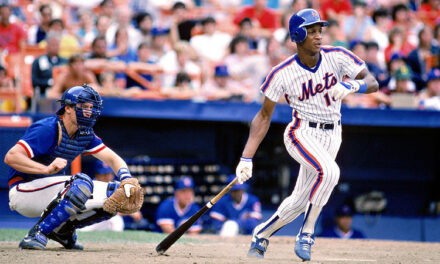Rich Lederer of Baseball Analysts, was kind enough to take some of my questions this week. I frequently visit his website for some great baseball insights. I hope you check it out and add him to your favorites. Enjoy the interview.
The Mets just made great strides in upgrading the bullpen with the additions of Putz and K-Rod. Will that be enough to secure a division title?
The Mets are looking good. Adding J.J. and K-Rod to a nucleus of Johan Santana, David Wright, Jose Reyes, Carlos Beltran, and Carlos Delgado may be enough to put the Mets over the top. However, it seems from afar that Omar Minaya still has some work left. The starting rotation remains unsettled and the incumbents at catcher, second base, and the corner outfield spots are nothing to write home about. The Mets have the makings for a very good team, but I’m not ready to etch their names on the NL East trophy just yet.
The Yankees just spent almost $250 million in two days by signing C.C. Sabathia and A.J. Burnett. There are several reports that they will secure either Mark Teixeira or Manny Ramirez as well. Is it time to fix the system?
The Yankees fixed the system a long time ago. Just kidding. Look, as a capitalist, I’m totally fine with a team like the Yankees paying a gazillion dollars for guys like Sabathia and Burnett. However, baseball isn’t a true free market. It’s a closed economy. A private country club, if you will. For example, if you and I wanted to put a new team in New York, Major League Baseball wouldn’t allow it. Therefore, it’s not a free market at all. The truth is, there should be more than just two teams in the New York City area. At least three. Maybe four or even five. Think about it for a minute. If there were several teams in New York dividing up the fan base, corporate market, and broadcasting revenues, the Yankees’ and Mets’ competitive advantage would dissipate in a hurry.
On the one hand, the baseball fan in me doesn’t want more teams in New York and fewer franchises in smaller markets around the country. On the other hand, I don’t like the fact that the large-market clubs have more resources than everyone else. The solution to this dilemma is that the playing field needs to be leveled one way or the other. Major League Baseball can accomplish this via a free market approach or by capping payrolls at a much lower level and/or re-distributing revenues to a much greater degree. Unfortunately, the New York, Los Angeles, and Chicago teams are never going to allow the first or third ideas, and the MLBPA won’t even hear of the second. Therefore, like it or not, we’re just going to have to learn to live with the way things are now (or at least something close to it).
In your opinion, who are the top five general managers in baseball?
That’s a tough question. If I were an owner, I would want Billy Beane or Theo Epstein to be my general manager. Epstein has been blessed with more resources than Beane over the years but both have been on the cutting edge of so many issues, staying ahead of the crowd in an increasingly sophisticated competitive environment.
I also respect several old-timers like Pat Gillick, Walt Jocketty, and John Schuerholz. It is hard to argue with their success. Mark Shapiro deserves to be in the discussion as well. There are also a few young guns (such as Andrew Friedman) who could work their way into the conversation over time.
Mets fans have been yearning for Gil Hodges to be elected to the Hall of Fame for a long time. Does he merit consideration, and were there any big snubs this year?
Hodges was one of the best first basemen of his day. However, he doesn’t really measure up to the standards of Hall of Famers as a player only. Hodges belongs in the Hall of the Very Good, along with dozens of other players. That said, you could make a case on his behalf if one was willing to give him a lot of credit as a manager. Joe Torre has an even better resume though, both as a player and as a manager. As such, if Hodges is deserving, then Torre is as well.
As it relates to the recent selections (or lack thereof) by the Veterans Committee, I believe Bill Dahlen, a turn-of-the-century shortstop, and Sherry Magee, an early 20th-century outfielder, have been two of the most overlooked candidates for decades. But it appears as if their time has come and gone. I would also like to see Ron Santo get his due during his lifetime.
While I was happy for Joe Gordon and his children, I don’t see how any objective analysis can rank him over Bobby Grich, a player who was on the ballot for one year only. Grich was a fantastic defensive second baseman who could also hit for power and draw a walk. He just may be the most unappreciated player of the post-WWII era. Let’s hope that Grich gets a second chance (although I’m not at all optimistic that he will be voted in, given how difficult it is for the Veterans Committee comprised of living Hall of Famers to agree on such things).
Who were the biggest winners and losers at Baseball Winter Meetings?
The Yankees and Mets did more to improve their teams than any other franchises in baseball. There hasn’t been enough activity yet to cite other winners or losers, but the Dodgers and Angels are in a position where they could be left on the outside looking in if they don’t sign Manny Ramirez and Mark Teixeira. Sure, both clubs may be able to sign an Adam Dunn or a Pat Burrell as a replacement but neither is going to provide the type of production that Manny and Tex did during the final two months of the 2008 season.
Between CC Sabathia at an average salary of $23.3 M, and Johan Santana at $22.9 M, which pitcher will prove to have been the best investment over the next six seasons?
Boy, six years is a long time to not only judge Sabathia and Santana but any pitcher. While CC and Johan are two of the best, my gut instincts tell me that I would prefer Santana to Sabathia over that time frame. He isn’t carrying 300 pounds around and his outstanding changeup may give him an edge as these two power pitchers age and gradually lose velocity.
To read more great baseball insights from Rich, please visit him at the Baseball Analysts.














